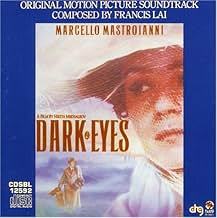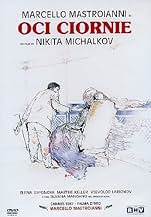IMDb RATING
7.3/10
3.7K
YOUR RATING
An Italian tells his story of love to a Russian. In a series of flashbacks, Romano Patroni leaves his wife to visit a spa where he falls in love with a Russian woman. He returns to Italy res... Read allAn Italian tells his story of love to a Russian. In a series of flashbacks, Romano Patroni leaves his wife to visit a spa where he falls in love with a Russian woman. He returns to Italy resolved to leave his wife and marry his love.An Italian tells his story of love to a Russian. In a series of flashbacks, Romano Patroni leaves his wife to visit a spa where he falls in love with a Russian woman. He returns to Italy resolved to leave his wife and marry his love.
- Nominated for 1 Oscar
- 12 wins & 22 nominations total
Elena Safonova
- Anna Sergeyevna, Governor's Wife
- (as Elena Sofonova)
Innokentiy Smoktunovskiy
- Il Governarore di Sisoev
- (as Innochentij Smoktunovskj)
Yuriy Bogatyryov
- Il Maresciallo
- (as Jury Bogatiriov)
Dmitriy Zolotukhin
- Konstantin
- (as Dimitri Zolothuchin)
Jean-Pierre Bardos
- Ospite sdraiato
- (as J. Pierre Bardos)
Elguja Burduli
- Il cuoco della nave
- (as Elgugia Burduli)
Pierluigi Cervetti
- Il maestro di ginnastica
- (as P. Luigi Cervetti)
Featured reviews
There are many wondrous qualities to this movie, especially the performance of Marcello Mastroianni. I only want to mention one scene, my favorite. It occurs when Romano (Mastroianni) arrives by train in the Russian village of Sisoev where he is to set up a glass factory.
Upon de-training all he sees is a peasant woman with a cow. Suddenly, on the other side of the tracks a band plays. Romano walks across the welcome-carpet to a crowd of townspeople giving him a raucous reception. Actually folks here want the factory for themselves . The Italian is offered Russian bread to sample. Young girls bear doves and present the man with wreaths. The mayor recites a poem and gives a welcome speech. A medal is bestowed. Kisses galore are planted.
Singers and balalaika players appear. Caviar and lethal vodka is thrust upon the man, who is barely able to cope with its potency. It's a distillation (pun intended) of Russian-ness which overwhelms the guest as he is conducted by carriage to his hotel and carried in, tired and soused, later muttering "Sabatchka," the name of the little dog belonging to Anna, the Russian girl that has aroused his passion. Great, great!
Upon de-training all he sees is a peasant woman with a cow. Suddenly, on the other side of the tracks a band plays. Romano walks across the welcome-carpet to a crowd of townspeople giving him a raucous reception. Actually folks here want the factory for themselves . The Italian is offered Russian bread to sample. Young girls bear doves and present the man with wreaths. The mayor recites a poem and gives a welcome speech. A medal is bestowed. Kisses galore are planted.
Singers and balalaika players appear. Caviar and lethal vodka is thrust upon the man, who is barely able to cope with its potency. It's a distillation (pun intended) of Russian-ness which overwhelms the guest as he is conducted by carriage to his hotel and carried in, tired and soused, later muttering "Sabatchka," the name of the little dog belonging to Anna, the Russian girl that has aroused his passion. Great, great!
for its wise simplicity. for its touching beauty. and for the high Mkhalkov precision to create the details. a film with an impressive cast - Mastroianni is the first violin but not the one - and example of inspired manner to use the Tchekov spirit and the glamor of a century beginning. a film like a puzzle in which each image, performance or scene is charming like a kind of gem, delicate and illustration of art of a master. a special meeting between art of few great actors and an unique director. and the flavor of a Russia who becomes different in contact with Mastroianni - it is not the only meeting , Sunflower is another , but in this case, far by war or Sophia Loren, the story seems be a precious drink in a crystal glass.for me, one of films who, after its end, proofs than it represents one of movies who you search for without know than it exists.
It's a movie in the best Mikhalkov's manner: simple but deep; funny and serious; a Russian picture with (this time) Italian colors; and as always, about the deepest depth of a Russian soul. Some may say, Mikhalkov's movies are of universal things - true, but they always touch something deeply Russian. Waiting ... love ... faith ... sincerity. When all that meets in one point, harmony and happiness come; when at least one element is missing, ... Romano comes. With all the consequences. Mikhalkov reminded me again - we live by the consequences of our actions. (i need to add a bit - they asked for the 10th line here :) BUT quantity is not quality!)
10adipocea
There's no really much you can say and analyze about this movie. It's not a movie by itself, it's a piece of art lost in the ocean of mundane cinema of the 20-th century. It's like the great literature, the great paintings of history, impregnated with a mystical and hard to define quality in it's texture. For me this is not simply a "movie", i say it again. Like Nostalghia or Andrei Rubliov of Tarkovsky , here the poetics transcends what we usually call cinema, or a film, because it gets a life on it's own, and becomes independent to critical observation. It's like a tiger in the Siberian forest, that you have to simply admire. A tiger is beautiful because it's a tiger, Oci Ciornie it's beautiful because it is Oci Ciornie. Something divine happened to Mihalkov and to the cast when thy made this piece of art. It was the greatest shame and scandal when the jury at Cannes awarded "Sous le Ciel de Satan" the Palme D'or, but who cares...Time is for the art what is for the wine. The good one gets better, the cheap one gets sour and becomes vinegar.
A Russian/Italian co-production sounds like an uneasy marriage of mismatched temperaments, but 'Dark Eyes' is a remarkably cohesive mutual effort offering the best of both worlds: a wonderfully romantic story, a healthy love of laughter and high spirits, and a lingering air of Slavic melancholy. It's being sold as a showcase for the perennial charm of Marcello Mastroianni, but the film has more than just his performance to recommend it. The script, condensed from several tales by Anton Chekhov, has the elegant simplicity of a classic short story, following a charming but buffoonish husband in his pursuit of an attractive young Russian back to her native country, where he discovers a nation of people even crazier than he is. Some of the smaller roles have been drawn for the broadest effect, but under Nikita Mikhalkov's meticulous direction every character emerges as a full blooded human being, with Mastroianni himself offering a sensitive portrait of a man too in love with life to take it seriously. A nagging reservation: the final irony revealed in the epilogue adds one coincidence too many, and comes close to spoiling the already poignant mood. Just pretend it never happened.
Did you know
- TriviaFinal film of Silvana Mangano.
- SoundtracksSonata per pianoforte n. 17 in Si bemolle maggiore, K. 570
Composed by Wolfgang Amadeus Mozart
Performed by Laurent Ferlet
- How long is Dark Eyes?Powered by Alexa
Details
Box office
- Gross US & Canada
- $2,201,428
- Gross worldwide
- $2,201,428
- Runtime
- 1h 58m(118 min)
- Color
- Sound mix
- Aspect ratio
- 1.85 : 1
Contribute to this page
Suggest an edit or add missing content
































